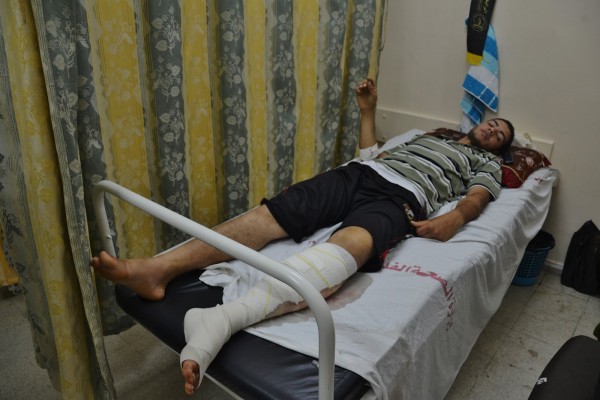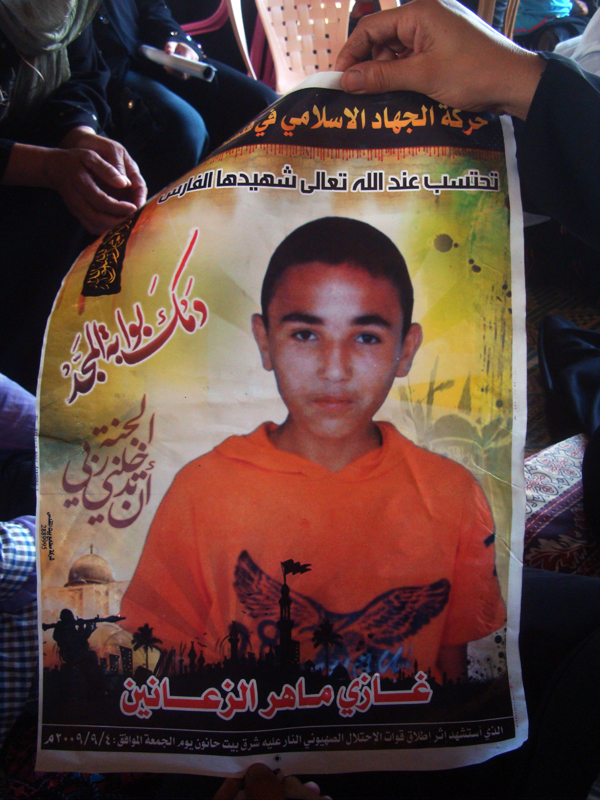By Rosa Schiano
21 May 2012 | il Blog di Oliva
On Sunday, May 20, an Israeli soldier shot a young
Palestinian farmer while on his land in Al-Quara, north east of Khan
Younis in the southern Gaza strip.
Waheed Ali Zer, 22 years old, was shot in his left
leg and remains hospitalized in Khan Younis’s Nasser hospital. We went
to go visit his family and Waheed’s brother Mohammed spoke to us about
the events that took place on Sunday.
“After being shot, Waheed began to crawl before being
picked up and taken to a first aid point. At the time, I was at
university.” Mohammed is a mathematics student at Al-Aqsa University and
he intends to pursue a PhD.
Waheed has three brothers and seven sisters, three of
which are married. The Zer family’s land is only 500 meters from the
Israeli border. Waheed’s uncle told us that the Israeli soldiers will
open fire at any time.
“Here in the Kussufim area, tanks and bulldozers will
often enter,” says Waheed’s uncle, “until three years ago, there were
many trees, olive trees, but they have all been destroyed by the
bulldozers. Also here where we are, a house has been demolished by a
bulldozer. If there are no tanks and bulldozers available, the Israeli
soldiers shoot from the control towers”.
Mohammed told us that Waheed was walking his donkey
when he saw a military jeep coming. Mohammed retreated back towards the
tent next to his house. An Israeli soldier emerged from the jeep and
shot at Mohammed from behind a small hill.
There was no warning, no bullet shots into the air. No notice, just one bullet, which was targeted directly at Waheed.
“My father carried Waheed in his arms while my mother cried,” one of Waheed’s brothers tells us.
We visited the land where Waheed was shot. On this
land the family cultivates oranges, eggplants, wheat, and olives. “Our
houses are very simple, we have no chance to protect ourselves,”
Mohammed’s uncle told us. “The plants and the trees are scared by the
Israelis, imagine us!” said Mohammed.
As I looked out across the land I noticed the
proximity of military towers. One of the towers is particularly close to
their land, with a machine gun visibly located on it. One of Waheed’s
aunts approached us. “Our life is very difficult, for this reason the
people go closer to the border to collect as much [harvest] as they
can,” she says.
Waheed’s family comes from Be’er Sheva. They are
refugees like many others after Israel displaced thousands of
Palestinians, proclaiming their state.
We went to Nasser hospital in Khan Younis to meet
Waheed. His left leg was wrapped in a bandage stained with blood and his
bed sheet was also tainted with blood and liquid. He had an expression
of suffering on his face after having been operated on while under
general anaesthesia. The bullet aimed at him perforated an artery and a
nerve.
“I had bought a donkey,” Waheed began to tell us,
“and I was taking it towards my land when I saw an [Israeli] jeep
coming. A soldier came out of the jeep and shot me. I fell to the ground
feeling my head spinning. The bullet entered from one side [of my leg]
and exited from the other side. I crawled and my father called an
ambulance which took a long time to arrive.”
I asked him if he wants to send a message to the
international community and he replied, “I ask for their solidarity with
the Palestinian people. I ask them to stop the Israeli attacks.”
During our visit to the hospital other relatives and
friends of Waheed arrived. One brought him some food. Waheed smiles to
his visitors but his eyes cannot hide his grief. A cotton curtain
separates him from the other beds of the crowded hospital.
A nurse arrived to tell us that we should go because
the visiting time is over. I left Waheed with the promise of going back
to his home for another visit. We will return to their area as an
international presence while the international community continues to
stay silent in the face of ongoing crimes against the civilians of the
Gaza Strip.




